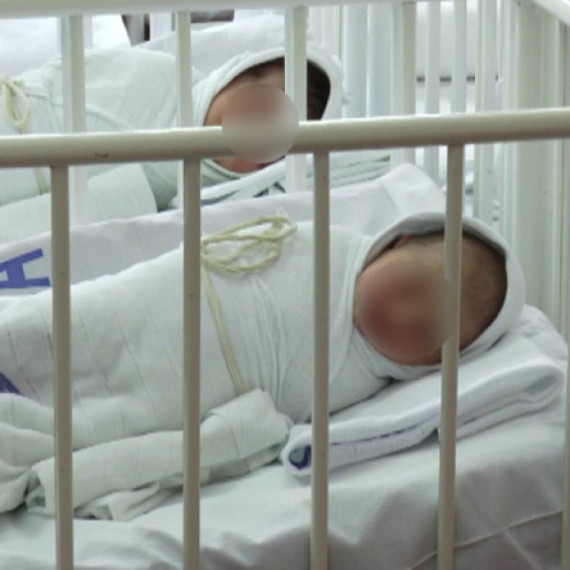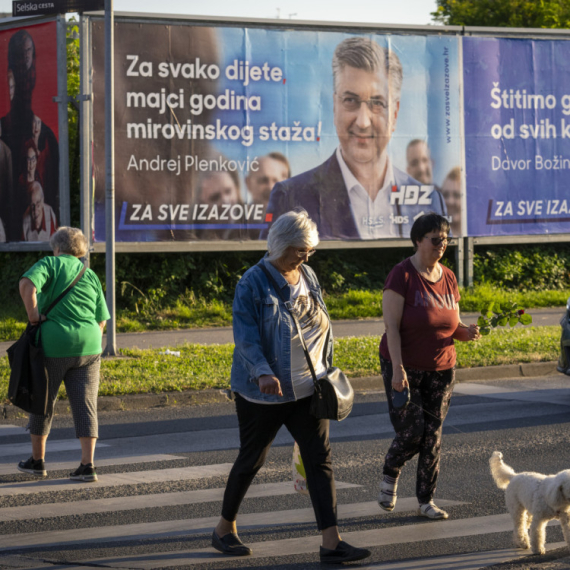British foreign minister to visit Belgrade
UK Foreign Secretary William Hague will be in Belgrade on Tuesday to meet with senior Serbian officials.
Monday, 30.08.2010.
09:24

Analysts say that UK Foreign Secretary William Hague will look to increase pressure on Belgrade to back down from its Kosovo resolution.
UK Foreign Secretary William Hague will be in Belgrade on Tuesday to meet with senior Serbian officials. After the visit of the German foreign minister last week, Hague would be the next from the EU to talk with Serbian officials about Belgrade’s resolution submitted to the UN General Assembly. British foreign minister to visit Belgrade After the announcements of President Boris Tadic that there would be consultations regarding the resolution with EU officials and Washington, there has been speculation in the UK that a compromise has been reached, and could be announced as Hague visits Belgrade. The resolution is expected to be discussed at the UN General Assembly on September 9. British analyst Mark Almond told the BBC that it is still unclear what the compromise could be based on. “It is possible that Serbia has backed down from its stance, because that is the only compromise that is being offered,” Almond said. “The Serbian government, and the government before Boris Tadic, offered everything but a sovereign independence for Kosovo. They offered wide autonomy in which the Kosovo government would have its own representatives in the international community for economic and cultural questions,” he reminded. “Therefore, the question is down to whether there will be one or two seats in the United Nations. Today it is not completely clear how Belgrade will be able to make a compromise with, unless its backs down from its position,” he said. Almond said that not only Belgrade, but also Brussels ought to ask themselves why so many differences have emerged about between them, with the “most pro-European government ever elected in Serbia.” The analyst noted that Hague has supported Bosnian Muslims during the war in Bosnia, and then NATO's attack on Serbia in 1999. According to the media, he and U.S. Secretary of State are now the biggest supporters of Kosovo independence and are lobbying hard against Serbia’s resolution. According to reports, Hague has even tried to convince China to vote against the draft. “One of his main advisors is Anelka Helic, a refugee from Bosnia. And as is the case with many fugitives, people who are forced to leave a place, their image of the country they left is frozen,” Almond said. “I think that one of Hague’s problems is that he is receiving a picture of the Balkans the way it was 15 years ago, not the way it is today. It is true that there is a dispute over Kosovo’s status. But, on the other side, compared to the case of what happened 18 years ago, there is no armed conflict now, and violence is not probable,” he said. “I believe that Hague and the politicians who make final decisions in London today, have not moved much from what happened during the war in Bosnia and the collapse of Yugoslavia,” he said. Hague will also be meeting with his Serbian counterpart Vuk Jeremic, who received support from South Africa for Serbia’s UN resolution during his visit to Pretoria on Monday. "More shuttle diplomacy" Branko Ruzic, an MP of the ruling Socialists (SPS), told B92 in Belgrade this Monday that the Hague visit was yet another phase in what he described as "EU's shuttle diplomacy". Ruzic, who also sits on the Parliamentary Committee for Foreign Affairs, said that he did not rule out the possibility of a historic compromise, but would not clarify who was supposed to compromise - Belgrade or Brussels. "I would like that this was a phase of the agreement. In negotiations, each side that takes part gets a little of what they did not want in the beginning," said he. "In no way can it be expected that only one side will make concessions, but in no way can we expect that what is defined in the Constitution and international law can be violated by official Belgrade," the SPS official continued. "The content (of the draft UNGA resolution) must in no way be in contrast of the so-called red lines that have been clearly defined in Serbia's platform, not only by this government, but by the previous one, and by all future governments, because this is an issue of continuity of preservation of our state and national interests," he concluded. Ahead of the visit tomorrow, political and economic analyst Dragomir Jankovic told B92 that Hague is not coming to Belgrade to negotiate changes to Serbia’s Kosovo resolution submitted to the UN General Assembly, however. “There would be no special negotiations. I am sure that the UK foreign secretary will give certain demands. The EU is not ready to negotiate so I am sure that there will be no negotiations,” Jankovic said. He said that the EU would not be dealing with the content of the resolution. “Serbia submitted the resolution without consultations with any international factors. The people from the EU will not be dealing with the contents of the resolution as much as they will be trying to convince Serbia that the way it has presented the resolution goes against Serbian interests,” Jankovic said. Despite the tense relations between Belgrade and Brussels, mainly because of this resolution, Jankovic said that the funds that the EU is giving Serbian from its IPA funds are not at risk of being taken away or stopped. “EU membership is not an economic, but a political decision. But the political agreement calls for economic reforms. Even if the EU refrains from accepting Serbia as an EU member-state, it will not refrain from supporting economic reforms. Economy is not a unilateral thing,” Jankovic said.
British foreign minister to visit Belgrade
After the announcements of President Boris Tadić that there would be consultations regarding the resolution with EU officials and Washington, there has been speculation in the UK that a compromise has been reached, and could be announced as Hague visits Belgrade.The resolution is expected to be discussed at the UN General Assembly on September 9.
British analyst Mark Almond told the BBC that it is still unclear what the compromise could be based on.
“It is possible that Serbia has backed down from its stance, because that is the only compromise that is being offered,” Almond said.
“The Serbian government, and the government before Boris Tadić, offered everything but a sovereign independence for Kosovo. They offered wide autonomy in which the Kosovo government would have its own representatives in the international community for economic and cultural questions,” he reminded.
“Therefore, the question is down to whether there will be one or two seats in the United Nations. Today it is not completely clear how Belgrade will be able to make a compromise with, unless its backs down from its position,” he said.
Almond said that not only Belgrade, but also Brussels ought to ask themselves why so many differences have emerged about between them, with the “most pro-European government ever elected in Serbia.”
The analyst noted that Hague has supported Bosnian Muslims during the war in Bosnia, and then NATO's attack on Serbia in 1999.
According to the media, he and U.S. Secretary of State are now the biggest supporters of Kosovo independence and are lobbying hard against Serbia’s resolution.
According to reports, Hague has even tried to convince China to vote against the draft.
“One of his main advisors is Anelka Helić, a refugee from Bosnia. And as is the case with many fugitives, people who are forced to leave a place, their image of the country they left is frozen,” Almond said.
“I think that one of Hague’s problems is that he is receiving a picture of the Balkans the way it was 15 years ago, not the way it is today. It is true that there is a dispute over Kosovo’s status. But, on the other side, compared to the case of what happened 18 years ago, there is no armed conflict now, and violence is not probable,” he said.
“I believe that Hague and the politicians who make final decisions in London today, have not moved much from what happened during the war in Bosnia and the collapse of Yugoslavia,” he said.
Hague will also be meeting with his Serbian counterpart Vuk Jeremić, who received support from South Africa for Serbia’s UN resolution during his visit to Pretoria on Monday.
"More shuttle diplomacy"
Branko Ružić, an MP of the ruling Socialists (SPS), told B92 in Belgrade this Monday that the Hague visit was yet another phase in what he described as "EU's shuttle diplomacy".Ružić, who also sits on the Parliamentary Committee for Foreign Affairs, said that he did not rule out the possibility of a historic compromise, but would not clarify who was supposed to compromise - Belgrade or Brussels.
"I would like that this was a phase of the agreement. In negotiations, each side that takes part gets a little of what they did not want in the beginning," said he.
"In no way can it be expected that only one side will make concessions, but in no way can we expect that what is defined in the Constitution and international law can be violated by official Belgrade," the SPS official continued.
"The content (of the draft UNGA resolution) must in no way be in contrast of the so-called red lines that have been clearly defined in Serbia's platform, not only by this government, but by the previous one, and by all future governments, because this is an issue of continuity of preservation of our state and national interests," he concluded.
Ahead of the visit tomorrow, political and economic analyst Dragomir Janković told B92 that Hague is not coming to Belgrade to negotiate changes to Serbia’s Kosovo resolution submitted to the UN General Assembly, however.
“There would be no special negotiations. I am sure that the UK foreign secretary will give certain demands. The EU is not ready to negotiate so I am sure that there will be no negotiations,” Janković said.
He said that the EU would not be dealing with the content of the resolution.
“Serbia submitted the resolution without consultations with any international factors. The people from the EU will not be dealing with the contents of the resolution as much as they will be trying to convince Serbia that the way it has presented the resolution goes against Serbian interests,” Janković said.
Despite the tense relations between Belgrade and Brussels, mainly because of this resolution, Janković said that the funds that the EU is giving Serbian from its IPA funds are not at risk of being taken away or stopped.
“EU membership is not an economic, but a political decision. But the political agreement calls for economic reforms. Even if the EU refrains from accepting Serbia as an EU member-state, it will not refrain from supporting economic reforms. Economy is not a unilateral thing,” Janković said.


























































Komentari 31
Pogledaj komentare